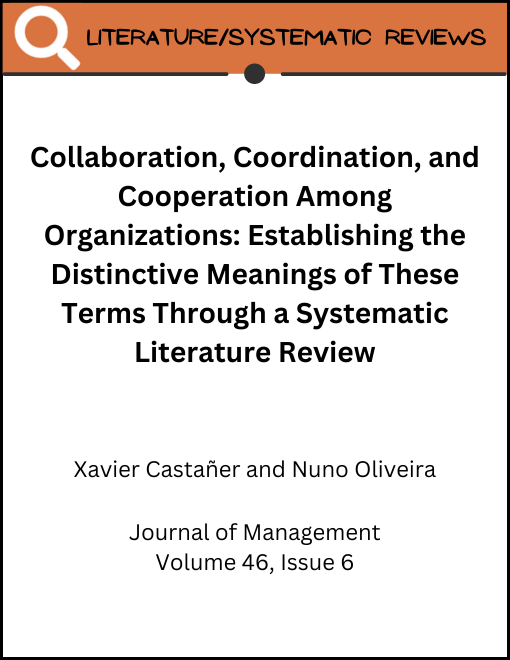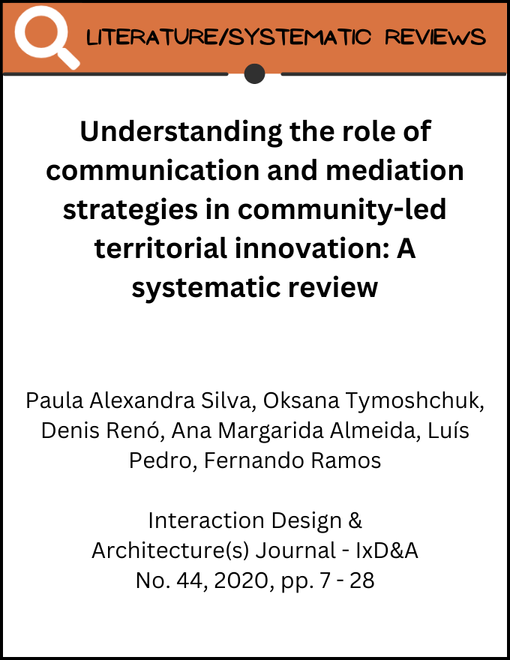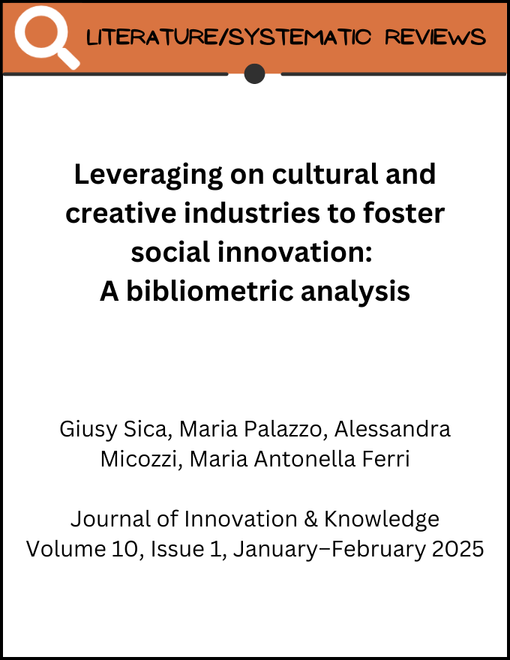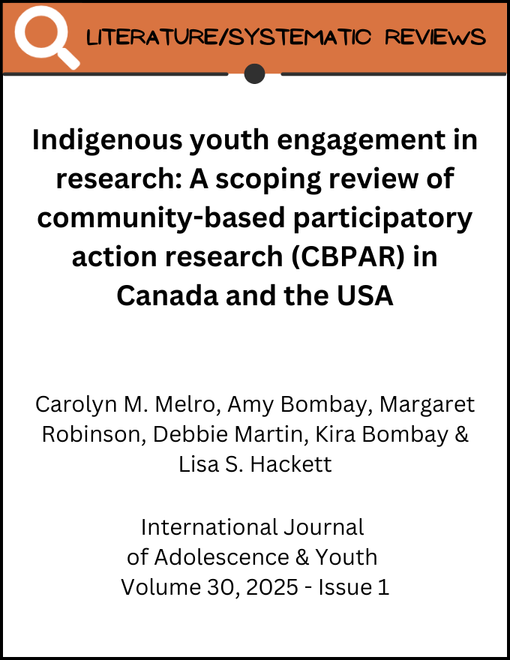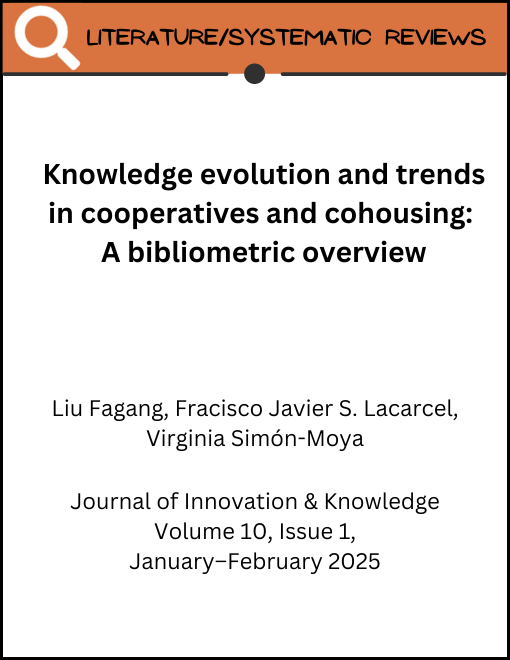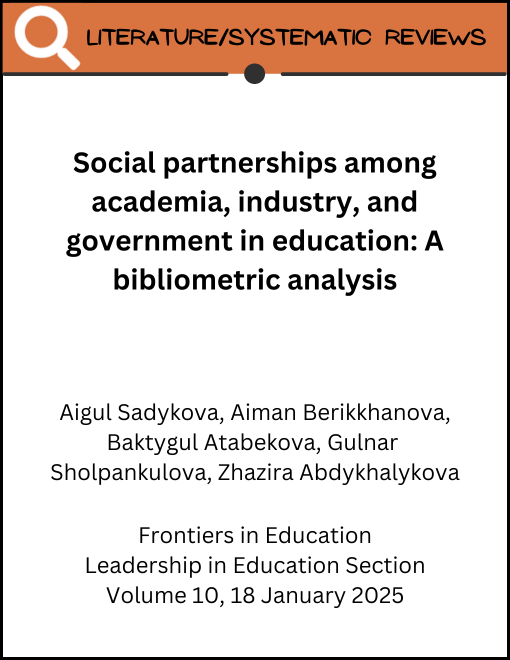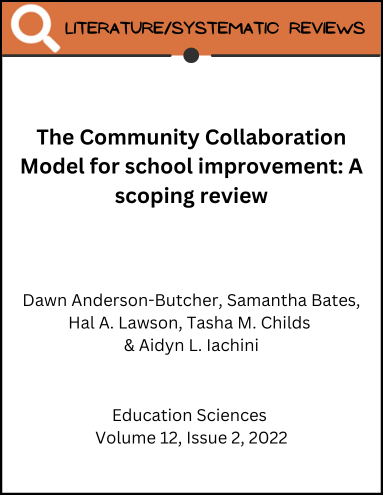Literature/
Systematic Reviews
It is often difficult to get a broad, research-based understanding of an issue. To curate access to research of interest, JCEC peer-reviews and publishes original works that are submitted to us, and links to Open Access works based on their Creative Commons licensing designation.
Click on the thumbnail article titles to be linked to the article.
Abstract Excerpt: Collaboration, coordination, and cooperation lie at the core of interorganizational activities. To address the confusion regarding the definitions of these three terms, recent works have proposed redefinitions. Although these proposals address an important concern, we believe that they might be premature because (1) they do not build on a systematic examination of how these terms have been used in the literature and (2) they seem to narrow the focus to a given theory and alliances only, which might unduly restrict the meaning of the terms defined. In this paper, we review the definitions of the three terms as they appear in nine top journals in the general management literature (1948-2017)…..Our review contributes to theoretical development by offering a conceptual redefinition of the three terms that renders them distinct and thus facilitates knowledge accumulation and theory development. Moreover, the set of interactional and discriminating dimensions generates a host of managerially relevant research questions about a wide range of interorganizational relationships. CC BY-NC 4.0 CLICK HERE
Abstract. This article brings together empirical academic research on community-led territorial innovation initiatives. By engaging in a systematic literature review, the research analyses the role of digital technology in supporting community-led initiatives. Besides identifying the technologies used, this research develops an understanding both on its purpose of use and on its relation to communication and mediation strategies. A clear gap is found not only in terms of research reporting on community-led initiatives, but also on research studying the specific use of digital technology by those communities, highlighting a need for future research in the area. From an initial set of 1312, six articles are identified which meet the inclusion criteria for this review and only five of them report on technology use. Results show that a diversity of digital technologies, from blogs to online repositories, is used by the initiatives analysed, leveraging on the global coverage of the Internet. Besides a key role in supporting community collaboration and cooperation, digital technology also emerges as an important vehicle for community debate and as an enabler of community empowerment and advocacy. CC BY-NC-ND CLICK HERE
Abstract: This study investigated the interplay between community-based cultural initiatives conducted by Cultural and Creative Industries (CCIs) and social innovation. Selecting peer-reviewed open-access articles that focus on the intersection of culture and innovation was the first step in our systematic literature review. Our analysis focused on the 76 most cited papers that included the keywords ‘community-led local development’, ‘social innovation’, and ‘cultural and creative industries’. The literature review revealed that CCIs can significantly promote social innovation through cultural engagement, particularly when they collaborate with various stakeholders. However, researchers differ in their emphasis on the nature of collaboration. Some argue that partnerships with businesses or academic institutions are essential for creating ‘heterogeneous sources of knowledge’ (HSK). Others contend that collaboration between government entities and local authorities is vital for fostering regional and local development. The third perspective introduces the notion of ‘entrepreneurial co-creation’, suggesting that CCIs work alongside stakeholders with technical and managerial expertise. Finally, there is a consensus that CCIs need to acquire new leadership skills and competencies to ensure sustainability and resilience. By synthesising these four perspectives, this study offers a comprehensive framework that positions CCIs at the core of a broader economic, territorial, managerial, and political context. CC BY-NC-ND 4.0 CLICK HERE
Abstract: Community-based participatory action research (CBPAR) is founded on meaningful collaboration with communities in the design and execution of research. CBPAR is gaining traction as an ethical and effective approach to research with underserved populations, including Indigenous youth. This scoping review examined 134 CBPAR studies involving Indigenous youth in Canada and the United States, to identify when, how, and to what extent Indigenous youth were engaged in research. Youth engagement was analysed on a continuum defined by the extent of decision-making throughout research. Indigenous youth participated in research decision-making in 62% of studies examined, with wide variation in extent and style of engagement. Youth wisdom and voices were often underutilized or undescribed in research decisions. However, many cases demonstrate that Indigenous youth can and do contribute meaningfully to research with and about their peers. Findings support a need for transparent reporting on how youth engagement is enacted in CBPAR. CC BY-NC 4.0 CLICK HERE
Abstract: Recent interest in alternative living and economic models has led scholars to turn their attention to cooperatives and cohousing communities. Cohousing communities are neighborhoods that are created and managed by residents, offering shared spaces and communal living to foster a sense of community and well-being. This study is based on comprehensive bibliometric analysis of the scientific literature on cooperatives and cohousing. The study describes the development of this research area, highlights key themes, explores interconnections, and creates knowledge on how this field has evolved. The analysis consists of examining bibliographic coupling, co-citations, and keyword co-occurrence in documents published in the Web of Science (WoS) from 1996 to 2024. The study identifies prominent themes, influential authors, and emerging trends. The findings contribute to the research on sustainable development and community-driven initiatives, offering insights into how cooperatives and cohousing can provide viable solutions to contemporary societal issues. The results reveal five main categories of future research on cohousing cooperatives: (i) Management and collaboration, (ii) Knowledge and dynamic capabilities, (iii) Innovation and technology, (iv) Trust and leadership, and (v) Strategies, organization, and sustainability. Within these categories, 17 future research directions can provide insight to support policies and practices that enhance the effectiveness and sustainability of cohousing cooperatives. This analysis advances the current understanding of how collective action and shared living arrangements can contribute to more resilient and equitable communities. CC BY-NC-ND 4.0 CLICK HERE
Abstract: This paper employed a bibliometric analysis technique to explore the literature on social partnership in education, aiming to uncover historical trends, research focus areas, influential publications, and contributors. Adopting a retrospective observational design, this study examined 1,208 journal articles in the Lens database from 1983 to 2023 related to education-practice partnerships. The research on the topic showed limited activity until late years, with a surge in publications. Key areas of interest included government involvement, healthcare-related partnerships, and collaborative approaches. Research methodologies such as qualitative research and empirical approaches were evident. Top-cited publications demonstrated enduring impact, while institutions and countries represented the multidimensional nature and global relevance of this field. The outcomes of this bibliometric analysis suggest that community-institutional partnerships, cooperative behavior, interprofessional relations, and government are the most important aspects of social partnerships embracing education entities. The results also imply that qualitative research is a valuable approach for investigating academic-practice collaborations. The findings of this study can inform policymakers about the need to consider strategies that promote interdisciplinary collaboration and address the evolving healthcare landscape. CC BY CLICK HERE
Abstract: Schools worldwide are developing innovative models in response to, and in anticipation of, societal changes. Aiming to address non-academic barriers to learning, while capitalizing on out-of-school time, some school and community leaders have prioritized family and community partnerships, especially in the United States (U.S.). The Community Collaboration Model (CCM) is one such U.S. partnership-oriented model of expanded school improvement. In contrast to some partnership-oriented models, the CCM prioritizes improvements in classrooms and communities, aiming to support students, assist teachers, and improve relationships beyond the typical school day. This scoping review examines 14 peer-reviewed articles which describe CCM-centered innovations and documented outcomes. Barriers and facilitators associated with CCM adoption and implementation in diverse U.S. school and community settings also are explored. CCM’s contributions to important student and school outcomes (e.g., increased access to mental health services, improved school climate, decreased discipline referrals) are documented in this scoping review. Some researchers have also described implementation-related facilitators (e.g., partnerships with universities) and barriers (e.g., initial resistance by educators) that influence the utility of the model in practice. Drawing on prior research, the authors discuss findings and implications for future research, educational policy, and practice. CC BY CLICK HERE

